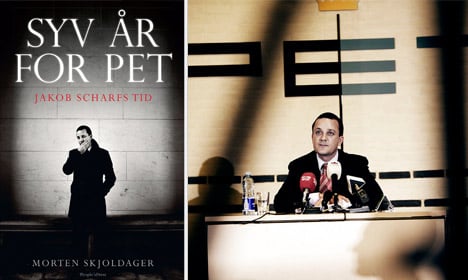BOOK
Danish security agency blocks book on former director
The Danish Security and Intelligence Service (PET) has been granted an injunction to block the release of a book about its former director.
Published: 7 October 2016 14:14 CEST

The agency blocked the book's release without having read it. Photos: People's Press, Erik Refner/Scanpix
PET said on Friday that the book ‘Syv år for PET’ (Seven years with PET) could “contain sensitive information” that could “put people in danger and damage PET's ability to prevent, investigate and combat crimes […] including terrorism”.
The book was written by journalist Morten Skjoldager and is based on interviews with former PET head Jakob Scharf, who left the agency in 2013.
The Copenhagen City Court granted the injunction, which the intelligence agency filed without even having read the book.
The agency said the action was taken based solely on the publisher’s description of the book, which said Scharf “exposes PET operations, the known and the unknown, and portrays the service’s dedicated agents and the art of recruiting an informant”.
“PET has unsuccessfully requested the manuscript for the book, so PET could investigate whether it actually contains such confidential information. If that is not the case, PET has no wish to prevent the book’s publication,” the agency wrote.
“The publisher has thus far not wished to give PET access to the manuscript,” it added.
Skjoldager said there is nothing in the book to warrant the agency’s action and said that journalistic principles kept him from sharing the manuscript with PET.
“I don’t believe it can be right that manuscripts, articles or other forms of journalism should be sent to PET or any other authorities for prior approval or censorship,” he told Ritzau.
Some 5,000 copies of the book have already been published by People’s Press and news agency Ritzau said that “a large number” of those books have already been distributed to booksellers. It was due to be released on October 17th.
Url copied to clipboard!


 Please whitelist us to continue reading.
Please whitelist us to continue reading.
Member comments